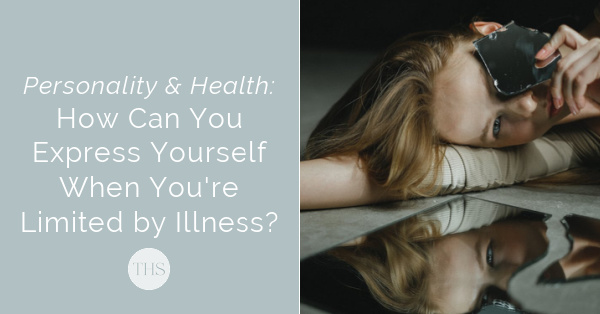How Finding an Online Community Can Help You Thrive with Chronic Illness

Ever since I became chronically ill, it has intrigued me: how your health affects your personality.
The reverse has been well-researched – how personality traits influence your overall health – but what about how you see yourself and how you’re able to express parts of your identity when you’re constantly limited by illness?
When I was a teenager suffering from inflamed joints, aching muscles and chronic fatigue, every doctor asked me fill in to countless of forms about the symptoms I was experiencing. That also included personality tests, to rule out (contributing) mental health problems and to help determine the most fitting treatment options.
But I often had some trouble answering the questions. Not because I didn’t understand them, and only partly because I felt my thoughts and feelings were far more complex than the multiple-choice options I could select.
No, the real problem was that the personality test questions often asked about my behavior, rating how often I was able to perform certain activities. For example, “I like to go to parties where there’s a lot of loud fun” or “I enjoy learning new things.”
Perfectly fine questions to learn more about someone’s basic personality traits, except when you’re limited by chronic illness, there’s a big gap between what you’d like to do and what you actually can do. So if you love learning new things, but chronic pain makes it impossible for you to focus on anything, how do you answer that?
And agreeing or disagreeing with statements like “I laugh easily” or “I am not a worrier” is not as easy as it seems, when you’re a cheerful person who’s now mostly alone and sick in bed, unable to join in on the fun.
I’m not sharing this story to bash on the validity of personality tests – I later became a psychologist after all – but because the complicated dance between illness and identity has fascinated me ever since.
When your actions are limited by illness, not once but for months or even years at a time, how does that affect how you see yourself?
How do you define who you are if being sick even affects your mood, your thought patterns and your deepest beliefs about life?

Let’s say you’re naturally extraverted, so personality-wise, you get a huge emotional boost from big family gatherings, dancing at concerts and going on wild amusement park rides. But now that you have migraine, long COVID or lupus, those situations have become too stimulating, leaving you with sensory overload, brain fog or a worsening of your symptoms.
Does that mean you’re not an extravert any more? Or is that simply a part of you that can no longer express easily?
The same goes for being an outdoorsy person who’s currently housebound, the sporty guy or girl who now struggles with limited mobility or the book lover who can no longer focus enough to read.
It’s not about being able to put the right label on yourself – ‘I am an introvert/crunchy momma/cars guy’ – but the friction or frustration you experience when there’s such a discrepancy between what makes you feel like you and what your body and brain can handle.
If you’re experiencing a discord between your personality and your ability to express yourself now that you’re chronically ill, what can you do?
Clearly, there’s no one-size-fits-all answer to this question, nor is there a wrong or right way to approach the issue. With that in mind, have a look at different ways you can start to feel more like yourself again.
Do what you love, but only for a shorter time or in a modified way.
Always been a reader? Try one page a day, choose short stories or poetry instead of heavy novels, or listen to audiobooks if that’s less taxing on your brain. Do you enjoy dancing? Bust out some moves for just one song, or ‘dance’ seated down by swaying your arms, bopping your head and tapping your feet.
Obviously, that doesn’t work for every form of self-expression – it’s impossible to go skiing when you’re bed bound – but it may be an option for some of the activities that make you feel like you.
Let’s say you’ve always seen yourself as creative, but now that you can no longer go to pottery class, sow your own clothes or paint big canvasses, you feel a little lost. What are doable ways you can still express yourself creatively? Maybe you are able to color, seated in bed with a laptop cushion, make bracelets or even dictate a novel.
Or more practically, if hiking used to be your favorite weekend activity, what exactly is it about walking in the woods that you loved most? Did you enjoy being in nature, the physical activity, experiencing a sense of freedom, adventure or mindfulness? See if you can fulfill that underlying desire in a modified way, like gardening to be outdoors or planning mini adventures for some excitement in your life.
It won’t be the same experience as before you became sick, but it can add some enjoyment to your life.

You are not a one-dimensional being. Of course it’s deeply sad and frustrating you can’t play sports like you used to – and you have every right to miss that part of yourself you’ve lost – but you’re more than a great runner or the strong quarterback.
You may also be the fun friend who always pulls jokes, a pretty decent cook, a dog lover or that person who knows the obscurest facts about any topic. Maybe during this period of your life, you can let those other parts of your identity shine if they are more attainable right now. For example, you can try new recipes, share funny memes on social media or listen to TED talks to gain more interesting insights.
You don’t necessarily have to give up ‘being sporty’ as part of your identity, you simply focus more on other aspects of your personality.
Sometimes, your life has been turned upside down in a way that you can’t go back to who you were before that happened. Your core beliefs about how the world works and what’s your place in it has just been shaken, or even shattered.
That doesn’t have to be a bad thing. Studies on post-traumatic growth revealed that after life-altering experiences, some people start to re-examine their lives in an effort to rebuild their beliefs about who they are, where they fit in and what their future may hold. As a result of developing a new way of thinking, feeling and behaving, these individuals gain something positive from their hardship, like personal strength or a new appreciation for life.
Redefining who you are is a complex process. It doesn’t happen overnight and you’ll probably go through a whole range of emotions – from grieving your old self to being angry at the world and finally accepting your new reality. You can find more helpful tips about these developments in the free article ‘Narrative Psychology: How to Rewrite Your Life Story’.
Just remember that the activities and preferences that shaped you into who you are today don’t even have to be present to still have an impact on your personality. Nothing can ever take away all the special and ordinary moments in your life that accumulated into you being you.
No matter your situation, don’t fully identify yourself with one label. That even includes your illness, as much as your health problems impact every aspect of your life – and I know it does.
Still, you are so much more than just a spoonie. You’re more than a computer nerd or beauty queen, an HSP or a wild child. Labels tend to work as a self-fulfilling prophecy: once we start to think about our personality and abilities in a fixed way, we unconsciously assume that we cannot do certain things or have to succeed at others.
And that’s a shame, because you are restricting your potential and self-expression.
What’s more, we all change in some form over the course of our lives. Through the good and bad things that happen to us, but also simply because time passes. You may have stopped loving partying all night any way as you’d gotten older. It just feels different when it’s a choice or progress to outgrow something, instead of being forced by illness to stop going out.

Your health influences your personality – and vice versa – in more ways than you may realize. Thankfully, with a little creativity, you can still find ways to express yourself despite the limitations of being chronically ill. It won’t be the same as before you became sick, but feeling more like yourself will certainly improve your wellbeing.
For more helpful advice, check out ‘Illness and Identity: Redefining Who You Are When Your Health Changes‘, read ‘Your Guide to Finding New Meaning with Chronic Illness’ or learn more about ‘Narrative Psychology: How to Rewrite your Life Story’.